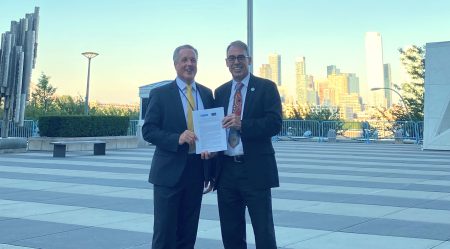Partnership to create new framework agreement will benefit Copernicus Services
Security, Land Monitoring and Emergency Management are among the Copernicus services set to benefit from a partnership to create new framework agreement for official geospatial data.
The European Environment Agency (EEA) and EuroGeographics, which represents Europe’s National Mapping, Cadastral and Land Registry Authorities, are strengthening cooperation to improve access to authoritative, up to date maps, geographic and land information. Their partnership is creating, maintaining, and implementing a Framework License agreement and exploring solutions for providing full, free, and open access to geospatial data for the Copernicus programme.
“This is a very important step in further strengthening the collaboration between the EEA and EuroGeographics to ensure the Copernicus programme has access to official geospatial data from national sources,” said Hans Bruyninckx, Executive Director, EEA.
“It will allow us to reap more benefits from investments made in Copernicus. Authoritative geospatial data is already making a difference, for example in responses to floods in Germany or Belgium and supporting national monitoring and emergency management. We are also using this data in our Copernicus Reference Data Access (CORDA) database, which catalogues and provides a series of curated and monitored links to enable quick access to official geospatial information.”
Sallie Payne Snell, Acting Secretary General and Executive Director, EuroGeographics adds: “This agreement builds on our long-standing agreement that enables the Copernicus Emergency Mapping Service to use members’ authoritative data to quickly produce maps for crisis management.”
“Not only will this new framework improve Copernicus services’ access to pan-European topographic, gazetteer and imagery datasets and services through the Open Maps for Europe interface, but it also ensures on-going access to administrative boundary data through our agreement with Eurostat.”
“By ensuring a clear mutual understanding of the Copernicus in-situ requirements and the information produced by our members, it will be easier than ever before for the services to use authoritative geospatial datasets.”
EuroGeographics is an international not-for-profit organisation (AISBL/ IVZW under Belgian Law. BCE registration: 833 607 112) and the membership association for the European National Mapping, Cadastral and Land Registry Authorities.
Open Maps For Europe is coordinated by EuroGeographics, the voice of European National Mapping, Cadastral and Land Registration Authorities, in partnership with the National Geographic Institute (NGI) Belgium. It is co-financed by the Connecting Europe Facility of the European Union.
The contents of this publication are the sole responsibility of EuroGeographics and do not necessarily reflect the opinion of the European Union.


 A new international collaboration will unlock the power of geospatial data to benefit people and planet by providing a platform for knowledge exchange and capacity building.
A new international collaboration will unlock the power of geospatial data to benefit people and planet by providing a platform for knowledge exchange and capacity building.